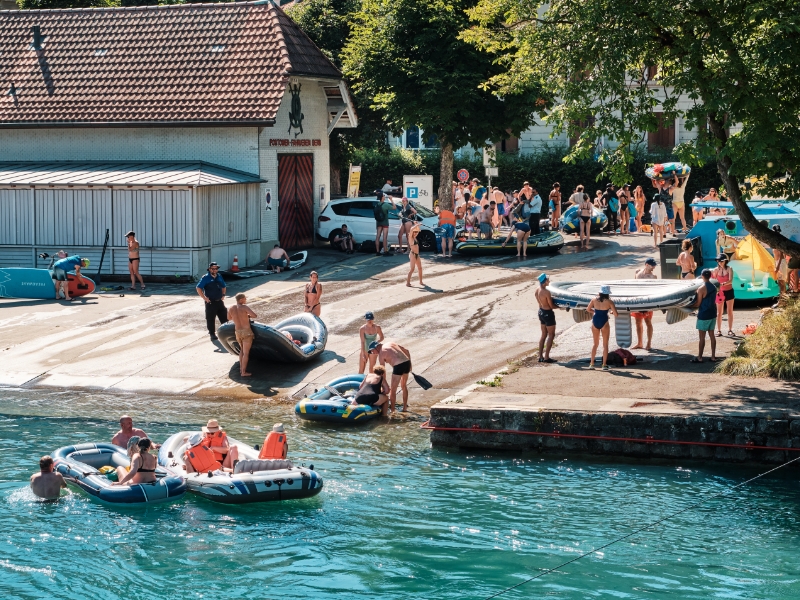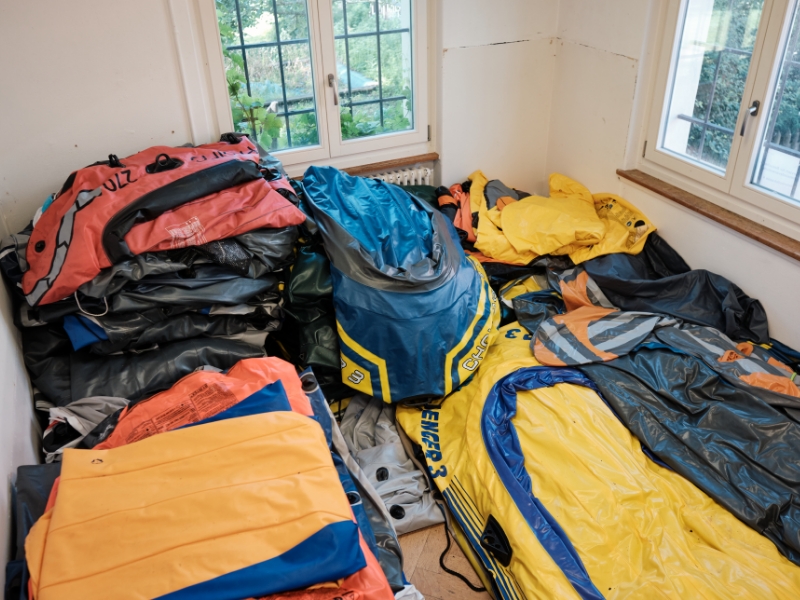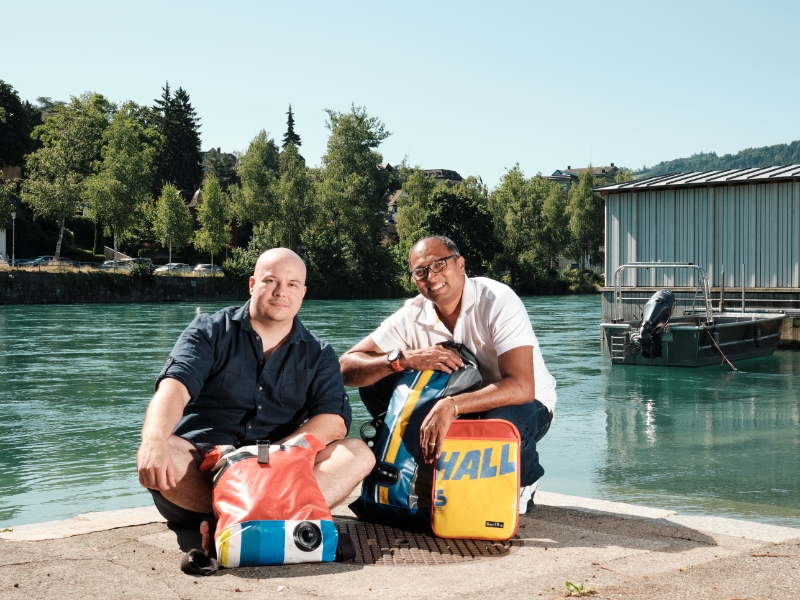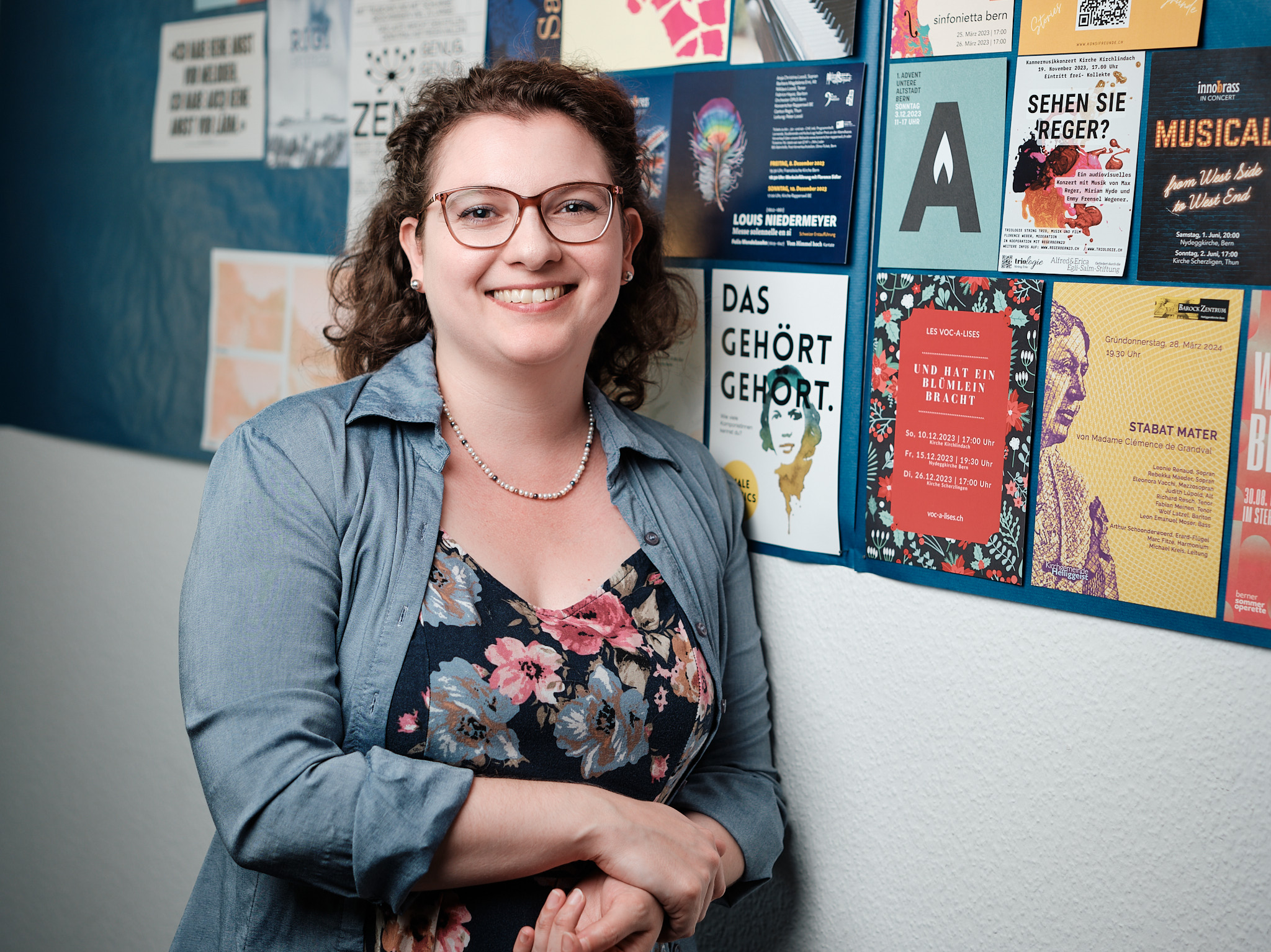Sustainable Bern-based start-up
Upcycled fashion from discarded Aare boats
They want to tackle the ecologically problematic consequences of discarded rubber boats: Elmo Francis and Yannick Käser turn discarded rubber boats into stylish bags.

“I’ve come at just the right time,” said Elmo Francis to himself, when in the summer of 2023 he read about Marieke Kruit, the current mayor of Bern, complaining on social media that rubber boats left behind by the Aare were a serious waste problem. At that time, Francis was thinking about how he could continue a project to recycle plastic waste that he had started in his native Sri Lanka in Bern. His idea was to make stylish, practical bags from discarded rubber boats.

Two years later, Elmo Francis and his business partner Yannick Käser are standing at the discharge point for rubber boats in Marzili in Bern, discussing plans for their start-up company Boat2Bag. Although it is already swelteringly hot, there are no boats in sight this summer morning. And there is nothing to be seen of the chaos that regularly prevails here at the weekend. Only large banners with inscriptions in German saying “Last journey for broken boats” and “Say goodbye here forever” indicate the littering problem. These banners are the City of Bern’s way of asking rubber boat owners to dispose of their vehicles correctly if they do not want to use them any more.
Three tons of discarded boats
Do people really just leave leisure equipment they have just bought behind them? It’s just too much trouble for many fans of Bern’s summer fun to take the boats with them, the company’s founders explain, shrugging their shoulders – or perhaps they have had just one beer too many. The fact is that last season, Boat2Bag procured almost three tons of raw material from the waste site dedicated to rubber boats, the equivalent of around 150 boats. According to Elmo Francis, some of them are unfortunately no longer in ideal condition to produce bags. To ensure that disposal is as straightforward as possible, the air is not released slowly, but air chambers of the boats are simply slit open. According to Francis, this makes cutting to size for the production of the bags more difficult.

After just one season, the collaboration between Boat2Bag and the Civil Engineering Department of the City of Bern is already running smoothly: When the hollow at the Dalmazi Bridge is full, the young entrepreneurs are notified and they then transport the discarded boats to their warehouse in a former post office building near Gümligen railway station. There, the raw material is cleaned for upcycling, cut and finally taken to Uri-based sewing company KoKoTé, which has been manufacturing bags, rucksacks and accessories for ten years. Until they can manufacture in Bern, this company is an ideal partner say the Boat2Bag founders, as it is committed to fair and sustainable production.
Magazine uniFOKUS

A part of Bern
This article first appeared in uniFOKUS, the University of Bern print magazine. Four times a year, uniFOKUS focuses on one specialist area from different points of view. Current focus topic: A part of Bern.
Combating plastic waste together
Elmo Francis and Yannick Käser met at the University of Bern. Francis attended courses as part of the “Open Lecture Hall” project, which aimed to offer refugees access to higher education, and Käser worked on the board of the student body of the University of Bern (SUB), which conducted this mentoring program between 2016 and 2023. When Elmo Francis came to Switzerland as an asylum seeker four years ago, he already had an impressive career to look back on. He was not only a successful mountaineer and a competitive swimmer, but the now 48-year-old also earned a Master’s degree in Human Relations and had worked for a long time in the top management of a major bank in Colombo. Yannick Käser (34) for his part completed a master’s degree in history and sustainability studies at the University of Bern and, in addition to his work at the SUB, is also involved in University policy.
Think globally, act locally
The political refugee, now recognized in Switzerland, asked the historian with a sustainability background for advice on how to concretize his project idea, which ultimately resulted in the founding of a joint small company with great ambitions. “If you don’t think big, you are limiting yourself,” explains Elmo Francis.

The start-up attracted a great deal of interest right from the start. For example, the Students4Sustainability initiative, which supports sustainability projects at Bern’s universities, selected Boat2Bag as its funding project and awarded it CHF 10,000. The Innovation Office of the University of Bern invited the start-up to its Innovators Unplugged event. The economic development organization Wirtschaftsraum Bern puts Boat2Bag in the spotlight with a video on its website. And recently, the European university alliance ENLIGHT honored the upcyclers from Bern with a sustainability award.
Crowdfunding to raise capital
An astonishing response for a start-up that is still in its infancy. Boat2Bag has only sold a very manageable number of products so far: around 15 of the 200-franc “Rhein” (Rhine) rucksack model. This has to do with the fact that the bags are not yet available in stores and the webshop only went live in June 2025. But there is nothing to buy there at the moment either. All five products listed – from wallets to laptop bags – are sold out. The problem of the start-up: There is a lack of capital. Boat2Bag cannot afford to have a basic stock of products produced. Currently, interested parties pay for the goods in advance: Only then will they be manufactured. But now the founders are intensively searching for funding. On the one hand, they have launched a crowdfunding campaign, and, on the other, they want to approach the municipality of Muri and the cantonal business development agency, among others, for support.
Subscribe to the uniAKTUELL newsletter

Discover stories about the research at the University of Bern and the people behind it.
The response that other start-ups can only dream of can probably be explained by Boat2Bag’s business model. At a time when the transformation of our entire economic system is required, exemplary examples of functioning upcycling are in demand. “We want to inspire others to join our movement,” says Elmo Francis. After all, a littering problem with rubber boats does not only exist on the River Aare, but also in cities such as Basel, Zurich and Berlin. And Yannick Käser believes that Boat2Bag is not a profit-oriented start-up, but an “ecoinitiative with a mission” – although: Being able to pay himself a salary would not be a bad thing.
ABOUT THE INSTITUTE FOR LEGAL ITALIAN LANGUAGE AT THE UNIVERSITY OF BERN
The Istituto di italiano giuridico at the University of Bern (Institute for Italian Legal Language) is the first university center dedicated to the enhancement and promotion of and research into Italian legal language. As Italian is one of the official languages of Switzerland, standard legal texts such as laws and ordinances, procedural texts such as judgments, and administrative texts such as decrees are also written in Italian. Interpretive texts such as monographs, com-mentaries, and scientific articles are also formulated in Italian. The new institute of the Univer-sity of Bern was founded in the city that houses the Federal Assembly of the Swiss Confedera-tion and the Federal Council, and therefore maintains direct relations and close collabora-tions with the Federal Chancellery, Legislation and Language Section, and the State Council of the Canton of Ticino

